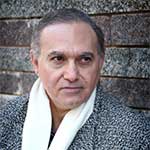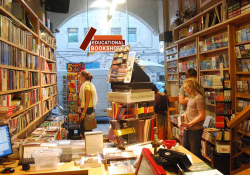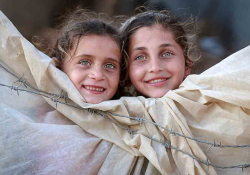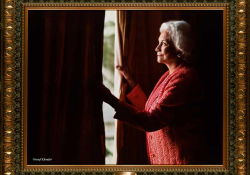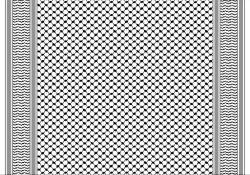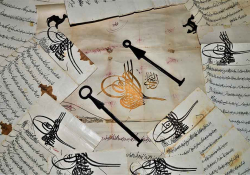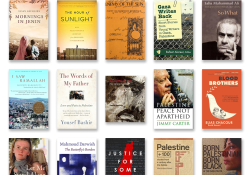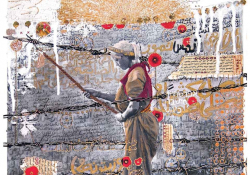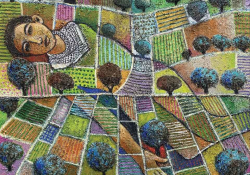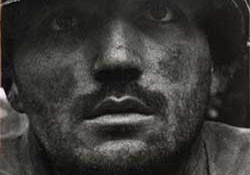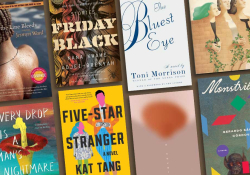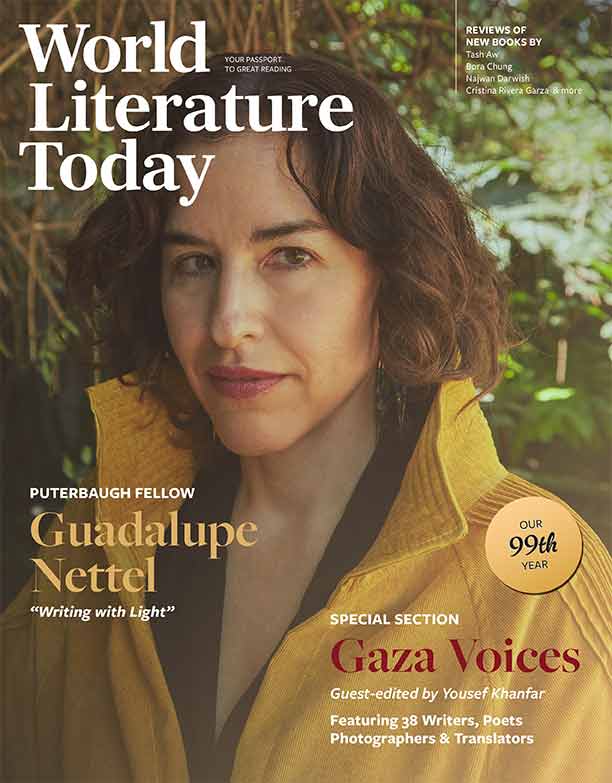My Gaza Bookshelf: 33 Essential Titles
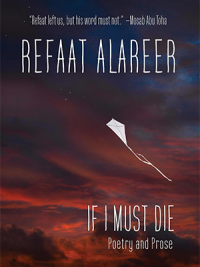
Refaat Alareer
If I Must Die: Poetry and Prose
Ed. Yousef M. Aljamal
OR Books, 2024 (see WLT, Dec. 2023)
The renowned poet and literature professor Refaat Alareer was killed by an Israeli airstrike in Gaza City alongside his brother, sister, and nephews in December 2023. He was just forty-four years old but had already established a worldwide reputation that was further enhanced when, in the wake of his death, the poem that gives this book its title became a global sensation. “If I Must Die” is included here, alongside Refaat’s other poetry. (Editorial note: WLT published a bilingual version of the poem, translated by D. P. Snyder, in December 2023. Omar Sabbagh’s review appears in the July 2025 issue.)
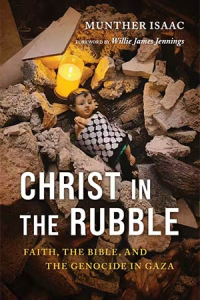 Munther Isaac
Munther Isaac
Christ in the Rubble: Faith, the Bible, and the Genocide in Gaza
Eerdmans, 2025
In this impassioned and incisive book, Munther Isaac challenges mainstream Christians’ uncritical embrace of the modern State of Israel. Speaking from his unique vantage point as a prominent Palestinian Christian pastor and theologian, he proclaims a truth that is rarely acknowledged in Christian circles: Israel’s campaign to eliminate the Palestinian people did not begin after October 7, 2023. Rather, the campaign is a continuation of a colonial project with nineteenth-century roots that has, since 1948, established systems of entrenched discrimination and segregation worse than South Africa’s apartheid regime.
Writing from Bethlehem with close-up knowledge of conditions on the ground, and rooted in a commitment to nonviolence and just peace, Isaac urges readers to recognize that support for Zionism entails a failure to bring a properly Christian theological criticism to bear upon colonialism, racism, and empire. He calls on Christians to repent of their complicity in the destruction of the Palestinian people. And he challenges them to realign their beliefs and actions with Christ—who can be found not among perpetrators of violence but with victims buried under the rubble of war.
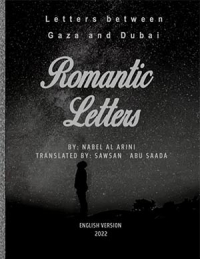 Nabel Al Arini
Nabel Al Arini
Letters between Gaza and Dubai: Romantic Letters
Trans. Sawsan Abu Saada
Independently published, 2020
Letters between Gaza and Dubai in the form of an epistolary novel, this collection simulates the reality of an ancient love story between a young man living in Gaza City and a Palestinian woman living in Dubai—letters were their only means of contact. The book embodies the philosophy of the two creatures; each of them lives in a world that differs from the world of the other, and they do not meet, like a fish and a sparrow, in difficult and complicated societal circumstances. The first forty-four letters were sent by email for five years.
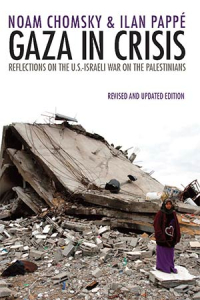 Noam Chomsky & Ilan Pappé
Noam Chomsky & Ilan Pappé
Gaza in Crisis: Reflections on Israel’s War Against the Palestinians
Hamish Hamilton, 2010
“Noam Chomsky is a global phenomenon . . . he may be the most widely read American voice on foreign policy on the planet today.”—New York Times Book Review
“Ilan Pappé is Israel’s bravest, most principled, most incisive historian.”—John Pilger
Gaza in Crisis is Noam Chomsky’s clear-sighted analysis of an area in a desperate impasse. From the targeting of schools and hospitals to the indiscriminate use of white phosphorus, Israel’s conduct in Operation Cast Lead has rattled even some of its most strident supporters. In Gaza in Crisis, Chomsky and Ilan Pappé survey the fallout from that devastation and place the massacre in Gaza in the context of Israel’s long-standing war against the Palestinians. It is a rigorous, historically informed, and much-needed analysis of the situation and will be welcomed by all those eager for Chomsky’s and Pappé’s insights into yet another political catastrophe.
Noam Chomsky is the author of numerous best-selling political books, including Hegemony or Survival, Failed States, Interventions, What We Say Goes, and Hopes and Prospects, all published by Hamish Hamilton/Penguin. Ilan Pappé is professor of history at the University of Exeter, co-director of the Exeter Centre for Ethno-Political Studies, director of the Palestine Studies Centre at the University of Exeter, and the author of various books, including the best-selling The Ethnic Cleansing of Palestine (Oneworld).
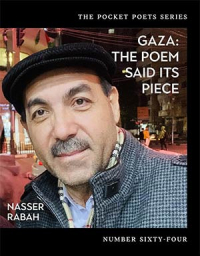 Nasser Rabah
Nasser Rabah
Gaza: The Poem Said Its Piece
Trans. Ammiel Alcalay, Emna Zghal & Khaled al-Hilli
City Lights Books, 2025
Like Mandelstam, Akhmatova, and Vallejo, Gazan poet Nasser Rabah embodies the magnificent possibilities of the human spirit and imagination under extreme conditions. Born in Gaza in 1963, Rabah spent some of his formative years in Egypt before returning to Gaza in his early twenties, where he has lived ever since. There, among the generations who built its neighborhoods and populate its villages, in a place of great natural beauty and vibrant cities, living under constant surveillance, military occupation, blockade, siege, and regular attack, in a culture steeped in literary and spiritual tradition, Rabah developed his distinctively singular vision and poetics.
This is Rabah’s first book in English translation. The poems include a selection from three of his published collections, along with new poems written since the full-scale Israeli assault on Gaza in October 2023. Throughout, we find a combination of irreverence and fidelity to tradition, a sense of surrealism infusing the depiction of everyday incomprehensibilities, and an unsettling, delicate tenderness always on edge in an atmosphere of sensory inundation and emotional saturation. Rabah’s poems can be raw and uninhibited by social or literary conventions, exploring and questioning one’s relationship to divinity in absurd circumstances while confronting the sacred cows of his own society, along with the sometimes-voyeuristic interest from those outside of it. His poetry constantly interrogates—sometimes playfully and sometimes in utter existential despair—the paradoxes and difficulties of expression and of writing itself. Nasser Rabah is a poet we have much to learn from.
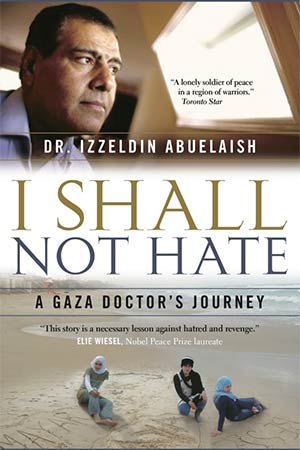 Izzeldin Abuelaish
Izzeldin Abuelaish
I Shall Not Hate: A Gaza Doctor’s Journey on the Road to Peace and Human Dignity
Bloomsbury USA, 2012
“A necessary lesson against hatred and revenge.”—Elie Wiesel, Nobel Peace Prize laureate
“In this book, Doctor Abuelaish has expressed a remarkable commitment to forgiveness and reconciliation that describes the foundation for a permanent peace in the Holy Land.”—President Jimmy Carter, Nobel Peace Prize laureate
A Harvard-trained Palestinian doctor born and raised in the Jabalia refugee camp in the Gaza Strip “who has devoted his life to medicine and reconciliation between Israelis and Palestinians” (New York Times), Izzeldin Abuelaish has been crossing the lines in the sand that divide Israelis and Palestinians for most of his life—as a physician who treats patients on both sides of the line; as a humanitarian who sees the need for improved health and education for women as the way forward in the Middle East; and, most recently, as the father whose daughters were killed by Israeli soldiers on January 16, 2009, during Israel’s incursion into the Gaza Strip. His response to this tragedy made news and won him humanitarian awards around the world.
Instead of seeking revenge or sinking into hatred, Abuelaish called for the people in the region to start talking to each other. His deepest hope is that his daughters will be “the last sacrifice on the road to peace between Palestinians and Israelis.”
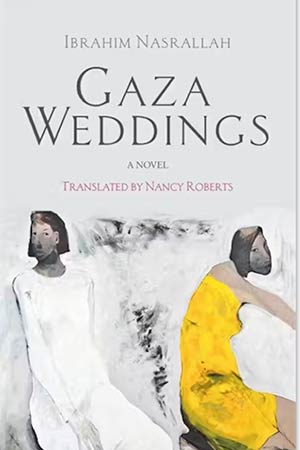 Ibrahim Nasrallah
Ibrahim Nasrallah
Gaza Weddings: A Novel
Trans. Nancy Roberts
Hoopoe, 2017 (see WLT, March 2018)
Twin sisters Randa and Lamis live in the besieged Gaza Strip. Inseparable to the point that even their mother cannot tell them apart, they grow up surrounded by the random carnage that characterizes life under occupation. Randa, who wants to be a journalist, writes to record the devastation around her, taking pictures of martyred children. Meanwhile, their beloved neighbor Amna quietly converses with all those she has lost, as she plans the wedding of Lamis and her son Saleh. With their menfolk almost entirely absent, it is the women who take center stage in this poignant novel of resilience, determination, and living against the odds.
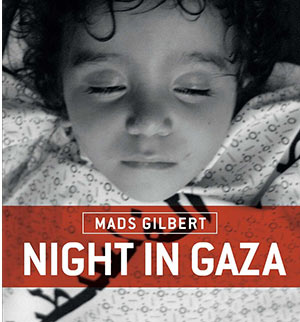 Mads Gilbert
Mads Gilbert
Night in Gaza
Trans. Guy Puzey
Olive Branch Press, 2015
A moving account in words and pictures of a doctor at work in Gaza. This book is a medical doctor’s account of what he witnessed in Gaza in the summer of 2014. It is a photo-essay you will not see on television or in the newspapers. On July 7, 2014, Israel launched a series of aerial attacks on Gaza, followed by the ground phase of the operation ten days later. Mads Gilbert arrived in Gaza on July 13 and worked day and night for the next two weeks at Al-Shifa Hospital, dealing with casualties, tending serious injuries, and trying to save lives. With the help of a small, black camera ready in the pocket of his green operating scrubs, he was able to document some of the human cost paid by the Palestinian people for enduring the Israeli occupation. He also kept a daily journal about the situation, with eyewitness accounts of the havoc wreaked by the Israeli attacks, and moving accounts of his interactions with ordinary Palestinians—men, women, and children—who had done nothing to deserve the horrific disruption to their lives. What Gilbert experienced was awful, and it was immense—the sounds of bombs and screaming, bodies torn to pieces, and a society reduced to rubble—but he also saw camaraderie, dignity, human courage, and unflinching resolve.
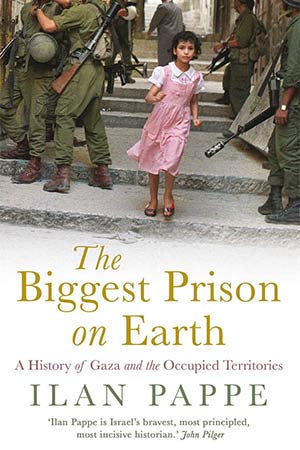 Ilan Pappé
Ilan Pappé
The Biggest Prison on Earth: A History of Gaza and the Occupied Territories
Oneworld, 2017
A powerful, groundbreaking history of the Occupied Territories from one of Israel’s most influential historians. From the author of the best-selling study of the 1948 War of Independence comes an incisive look at the Occupied Territories, picking up the story where the ethnic cleansing of Palestine left off. In this comprehensive exploration of one of the world’s most prolonged and tragic conflicts, Pappé uses recently declassified archival material to analyze the motivations and strategies of the generals and politicians—and the decision-making process itself—that laid the foundation of the occupation. From a survey of the legal and bureaucratic infrastructures that were put in place to control the population of over one million Palestinians to the security mechanisms that vigorously enforced that control, Pappé paints a picture of what is to all intents and purposes the world’s largest “open prison.”
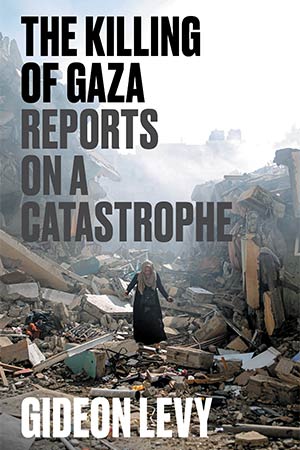 Gideon Levy
Gideon Levy
The Killing of Gaza: Reports on a Catastrophe
Trans. David B. Green
Verso, 2024
Gideon Levy is one of the most respected critics of Israel’s apartheid policies against the Palestinian people. An outspoken, award-winning journalist, he has been writing on the conflict for decades. In The Killing of Gaza, he brings together his on-the-ground perspectives of the events leading up to the October 7 attack and the ensuing devastation of Gaza. His clear-eyed analysis is a vital aperture into current events, but he also brings essential historical and political context to the moment. He is unafraid to speak truth to power, and his work is an urgent rebuttal to the propaganda that is distributed through the mainstream press throughout the world. Levy’s words should be read by anyone who wants to get to the heart of this most brutal conflict and see for themselves that silence is no longer possible in the face of such atrocity.
 Immanual Joseph
Immanual Joseph
I Am a Child of Gaza: A Glimpse into the World of a Child Victim of War
Independently published, 2024
This book is not a political statement. It is an effort to document a child’s experience of war. Meet Mariam, a nine-year-old girl from Gaza. After losing her family in a bomb that destroyed their home, she now lives in a tent in a refugee camp with her aunt. Navigating her new realities, Mariam is trying to make sense of her life through her experiences while dreaming of a better world.
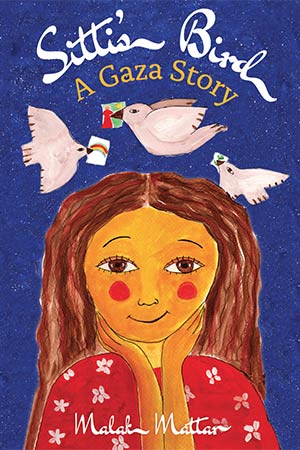 Malak Mattar
Malak Mattar
Sitti’s Bird: A Gaza Story
Illus. Malak Mattar
Crocodile Books, 2022
Malak is a little girl who lives in Gaza with her parents. She goes to school, plays in the ocean, and visits Sitti’s house on Fridays. One day while she is in school, bombings begin. She spends the next fifty days at home with her parents, worrying and feeling scared, until one day she picks up her paintbrush . . .
Sitti’s Bird: A Gaza Story is a unique children’s picture book, written and illustrated by Palestinian artist Malak Mattar. Reflecting her experiences of childhood in occupied Palestine, Malak’s story brings warmth and wonder to children as it tells of her rebirth as an artist during the 2014 airstrikes on Gaza. It is the story of a young girl whose love for her family and discovery of art help her channel her fears and overcome traumas that few of us can imagine—traumas shared by countless children in Gaza and around the world.
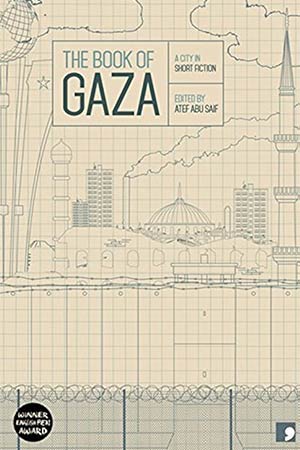 The Book of Gaza: A City in Short Fiction
The Book of Gaza: A City in Short Fiction
Ed. Atef Abu Saif
Comma Press, 2014
Bringing together a dozen of Palestine’s greatest modern prose writers, this unique anthology sets contemporary stories against the backdrop of one of the world’s most talked-about cities, presenting them in English translation for the first time. Together, these stories will enable English-speaking readers to go beyond the global media coverage and enter into the daily life of ordinary characters struggling to live with dignity in what is effectively the world’s largest prison. The authors range from highly acclaimed writers to exciting new voices in Arabic literature, including the “Father of the Palestinian short story,” Zaki Al Ela, and a new generation of young women bloggers and activists, such as Mona Abu Sharikhm, Dawlat Al Masri, and Najla Attalah.
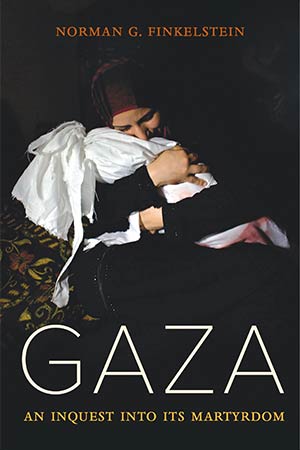 Norman Finkelstein
Norman Finkelstein
Gaza: An Inquest into Its Martyrdom
University of California Press, 2018
The Gaza Strip is among the most densely populated places in the world. More than two-thirds of its inhabitants are refugees, and more than half are under eighteen years of age. Since 2004, Israel has launched eight devastating “operations” against Gaza’s largely defenseless population. Thousands have perished, and tens of thousands have been left homeless. In the meantime, Israel has subjected Gaza to a merciless, illegal blockade. Finkelstein’s inquest remains indispensable reading.
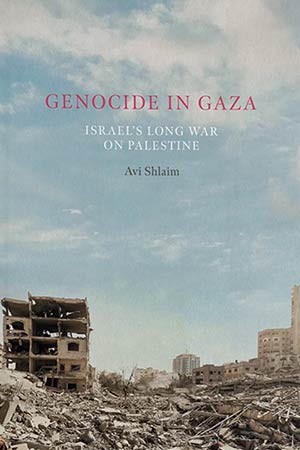 Avi Shlaim
Avi Shlaim
Genocide in Gaza: Israel, Hamas, and the Long War on Palestine
Irish Pages Press, 2025
The brutal war launched by Israel on the Gaza Strip in response to the Hamas attack of October 7, 2023—or Operations Swords of Iron, to give it its official name—was a major landmark in the blood-soaked history of the Israeli–Palestinian conflict. This was the eighth Israeli military offensive in Gaza since Operation Cast Lead of December 2008. It was also the most savage, destructive, and lethal attack, with a death toll that exceeded by far the combined total of the previous seven offensives.
In this book, Avi Shlaim places Israel’s policy toward the Gaza Strip under an uncompromising lens. He argues that these recurrent attacks—what Israeli generals chillingly call “mowing the lawn”—are the inevitable result of Zionist settler colonialism, whose basic objective is the elimination of the native population. In this war, however, Israel has gone beyond land-grabbing and ethnic cleansing to commit the crime of all crimes: genocide. Providing Israel with the weapons of mass murder as well as diplomatic protection at the UN makes America not only complicit but an enabler of Israel’s egregious war crimes. Noam Chomsky observes that “Settler colonialism is the most extreme and vicious form of imperialism.” There is no better illustration of this eternal truth than Israel’s long and cruel war against the Palestinian people on the West Bank and the Gaza Strip.
Donald Macintyre
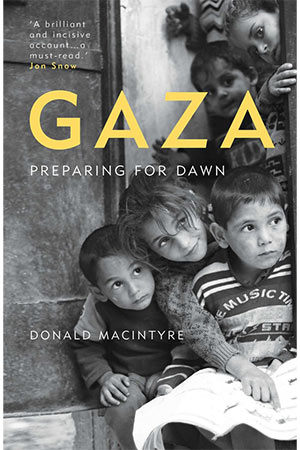 Gaza: Preparing for Dawn
Gaza: Preparing for Dawn
Simon & Schuster, 2017
Uniquely imprisoned, most Palestinians in Gaza cannot travel beyond the confines of the Strip, and in times of war, escape is impossible. They live under siege—economic and armed—and yet so many remain courageous, outspoken, and steadfast. Donald Macintyre lays bare Gaza’s human tragedy and reveals how it became a crucible of conflict and a byword for suffering. He identifies the repeated failings—including those of the international community—that have seen countless opportunities for peace pass by. Yet, against all odds, hope for a better future lingers. Gaza was once a flourishing coastal civilization open to the world. Could it be so again?
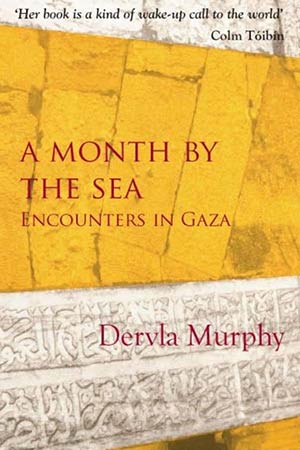 Dervla Murphy
Dervla Murphy
A Month by the Sea: Encounters in Gaza
Eland Books, 2013
Over the summer of 2011, Dervla Murphy spent a month in the Gaza Strip. She met liberals and Islamists, Hamas and Fatah supporters, rich and poor. Through reported conversations, she creates a vivid picture of life in this coastal fragment of self-governing Palestine. Bombed and cut off from normal contact with the rest of the world, life in Gaza is beset with structural, medical, and mental health problems, yet it is also bursting with political engagement and underwritten by an intense enjoyment of family life.
During her month by the sea, Dervla develops an acute eye for the way in which isolation has shaped this society. Time and again she meets men who have returned to the Strip as an act of presence. Yet the mosque is often their only daily activity, as difficulties obtaining supplies mean few opportunities for creative work. This acts as a recruiting opportunity for the Islamist Qassam brigades and a pressure cooker for the creation of domestic tyrants. In this situation, Dervla becomes a shameless supporter of women’s rights, acting as agony aunt and feminist mentor by turn. The ironies of Western and Israeli attitudes to the Strip are ever present: most notably the championing of democracy yet the refusal to recognize the legitimacy of Hamas; and the way in which violent attempts to eradicate terrorism breathe life into the very monster they aspire to destroy.
Even so, there is a still, small note of hope. For underlying the book is Dervla’s determination to try to understand how Arab Palestinians and Israeli Jews might forge a solution and ultimately live in peace.
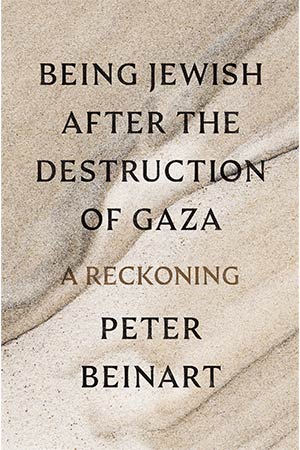 Peter Beinart
Peter Beinart
Being Jewish after the Destruction of Gaza: A Reckoning
Knopf, 2025
In Peter Beinart’s view, one story dominates Jewish communal life: that of persecution and victimhood. It is a story that erases much of the nuance of Jewish religious tradition and warps our understanding of Israel and Palestine. After Gaza, where Jewish texts, history, and language have been deployed to justify mass slaughter and starvation, Beinart argues, Jews must tell a new story. After this war, the horror of which will echo for generations, they must do nothing less than offer a new answer to the question: What does it mean to be a Jew?
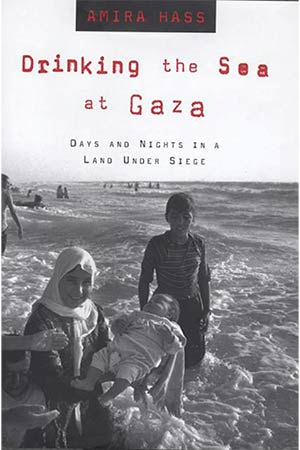 Amira Hass
Amira Hass
Drinking the Sea at Gaza: Days and Nights in a Land under Siege
Trans. Maxine Nunn
Henry Holt, 2014
In 1993 Amira Hass, a young Israeli reporter, drove to Gaza to cover a story and stayed, the first journalist to live in the grim Palestinian enclave so feared and despised by most Israelis that, in the local idiom, “Go to Gaza” is another way to say “Go to hell.” Now, in a work of calm power and painful clarity, Hass reflects on what she has seen in the Gaza Strip’s gutted streets and destitute refugee camps.
Drinking the Sea at Gaza maps the zones of ordinary Palestinian life. From her friends, Hass learns the secrets of slipping across sealed borders and stealing through night streets emptied by curfews. She shares Gaza’s early euphoria over the peace process and its subsequent despair as hope gives way to unrelenting hardship. But even as Hass charts the griefs and humiliations of the Palestinians, she offers a remarkable portrait of a people not brutalized but eloquent, spiritually resilient, bleakly funny, and morally courageous.
Full of testimonies and stories, facts and impressions, Drinking the Sea at Gaza makes an urgent claim on our humanity. Beautiful, haunting, and profound, it will stand with the great works of wartime reportage.
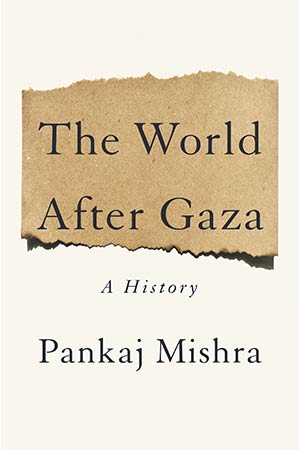 Pankaj Mishra
Pankaj Mishra
The World after Gaza: A History
Penguin Random House, 2025
The postwar global order was in many ways shaped in response to the Holocaust. That event became the benchmark for atrocity and, in the Western imagination, the paradigmatic genocide. Its memory orients so much of our thinking and crucially forms the basic justification for Israel’s right, first, to establish itself and then to defend itself. But in many parts of the world, ravaged by other conflicts and experiences of mass slaughter, the Holocaust’s singularity is not always taken for granted, even when its hideous atrocity is. Outside of the West, Pankaj Mishra argues, the dominant story of the twentieth century is that of decolonization.
The World after Gaza takes the current war, and the polarized reaction to it, as the starting point for a broad reevaluation of two competing narratives of the last century: the Global North’s triumphant account of victory over totalitarianism and the spread of liberal capitalism, and the Global South’s hopeful vision of racial equality and freedom from colonial rule. At a moment when the world’s balance of power is shifting, and the Global North no longer commands ultimate authority, it is critically important that we understand how and why the two halves of the world are failing to talk to each other.
As old touchstones and landmarks crumble, only a new history with a sharply different emphasis can reorient us to the world and worldviews now emerging into the light. In this concise, powerful, and pointed treatise, Mishra reckons with the fundamental questions posed by our present crisis—about whether some lives matter more than others, how identity is constructed, and what the role of the nation-state ought to be. The World after Gaza is an indispensable moral guide to our past, present, and future.
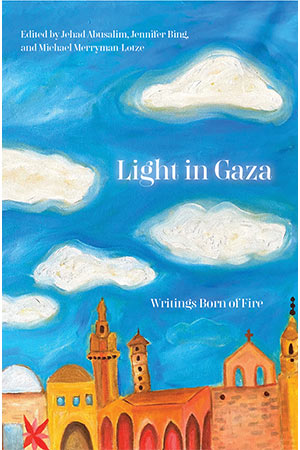 Light in Gaza: Writings Born of Fire
Light in Gaza: Writings Born of Fire
Ed. Jehad Abusalim & Jennifer Bing
Haymarket Books, 2022
Light in Gaza is a seminal, moving, and wide-ranging anthology of Palestinian writers and artists. It constitutes a collective effort to organize and center Palestinian voices in the ongoing struggle. As political discourse shifts toward futurism as a means of reimagining a better way of living, beyond the violence and limitations of colonialism, Light in Gaza is an urgent and powerful intervention into an important political moment.
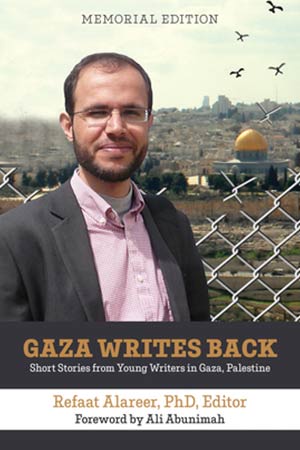 Gaza Writes Back: Short Stories from Young Writers in Gaza, Palestine
Gaza Writes Back: Short Stories from Young Writers in Gaza, Palestine
Ed. Refaat Alareer
Just World Books, 2014
Gaza Writes Back is a compelling anthology of short stories from fifteen young writers in Gaza, members of a generation that has suffered immensely under Israel’s siege and blockade. Their experiences, especially during and following Israel’s 2008–2009 offensive known as Operation Cast Lead, have fundamentally impacted their lives and their writing. Their words take us into the homes and hearts of moms, dads, students, children, and elders striving to live lives of dignity, compassion, and meaning in one of the world’s most embattled communities. Readers will be moved by the struggles big and small that emerge from the well-crafted writing by these young people, and by the hope and courage that radiate from the authors’ biographies.
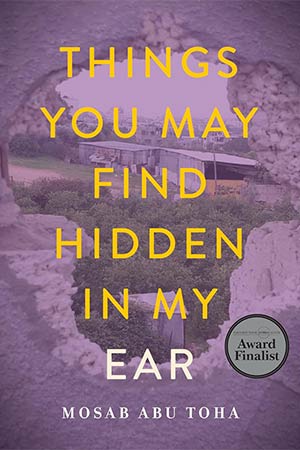 Mosab Abu Toha
Mosab Abu Toha
Things You May Find Hidden in My Ear: Poems from Gaza
City Lights, 2022 (see WLT, Jan. 2023)
In this poetry debut, Mosab Abu Toha writes about his life under siege in Gaza, first as a child, and then as a young father. A survivor of four brutal military attacks, he bears witness to a grinding cycle of destruction and assault, and yet his poetry is inspired by a profound humanity.
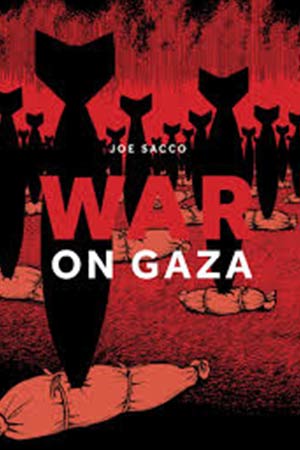 Joe Sacco
Joe Sacco
War on Gaza
Fantagraphics, 2024
Joe Sacco is well known as an unflinching chronicler of the injustice inflicted on the Palestinian people (Palestine, 1993; Footnotes in Gaza, 2010). He continues this mission with War on Gaza, a series of graphic commentaries on Israel’s rampage that began more than a year ago and continues relentlessly today.
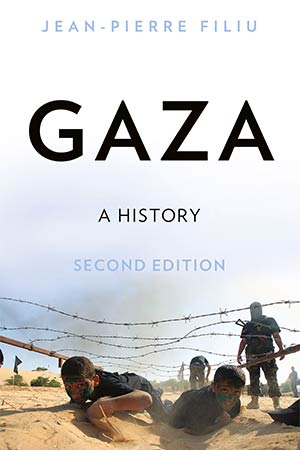 Jean-Pierre Filiu
Jean-Pierre Filiu
Gaza: A History
Oxford University Press, 2014
Gaza has become synonymous with conflict and dispute. Though only slightly larger than Omaha, Nebraska, at 140 square miles, the small territory of Gaza has been a hot spot for bitter disputes between sparring powers for millennia, from the Ancient Egyptians up until the British Empire and even today.
Wedged between the Negev and Sinai deserts on one side and the Mediterranean Sea on the other, Gaza was contested by the pharaohs, Persians, Greeks, Romans, Byzantines, Arabs, Fatimids, Mamluks, Crusaders, and Ottomans. Then in 1948, 200,000 people sought refuge in Gaza, a marginal area neither Israel nor Egypt wanted. It is here that Palestinian nationalism grew and sprouted into a dream of statehood, a journey filled with much strife.
Though small in size, Gaza’s history is nothing short of monumental. Jean-Pierre Filiu’s Gaza is the first complete history of the territory in any language. Beginning with the Hyksos in eighteenth century BCE, Filiu takes readers through modern times and the ongoing disputes of the region, ending with what may be in store for the future.
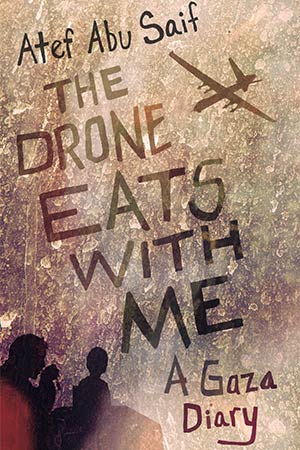 Atef Abu Saif
Atef Abu Saif
The Drone Eats with Me: A Gaza Diary
Beacon Press, 2016
The Drone Eats with Me is an unforgettable rendering of everyday civilian life shattered by the realities of twenty-first-century warfare. Israel’s 2014 invasion of Gaza lasted fifty-one days, killed 2,145 Palestinians (578 of them children), injured over 11,000 people, and demolished more than 17,000 homes. Atef Abu Saif, a young father and novelist, puts an indelibly human face on these statistics, providing a rare window into the texture of a community and the realities of a conflict that is too often obscured by politics.
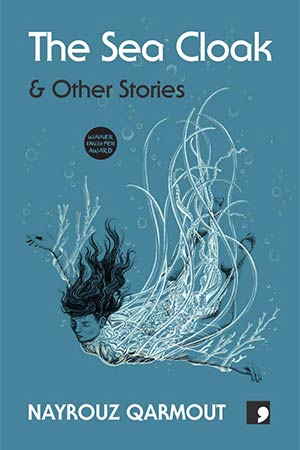 Nayrouz Qarmout
Nayrouz Qarmout
The Sea Cloak: And Other Stories
Comma Press, 2019
Drawn from her experiences of growing up as a young woman in the “world’s largest prison”—Gaza—Nayrouz Qarmout’s stories stitch together a stirring patchwork of perspectives exploring what it means to be a Palestinian today. Whether following the daily struggles of orphaned children fighting to survive in the rubble of recent bombardments or mapping the complex tensions between political forces vying to control Palestinian lives, these stories offer a rare insight into one of the most talked about but least understood places in the Middle East. Taken together, they afford us a local perspective on a global story, always rooted firmly in that most cherished of things: the home.
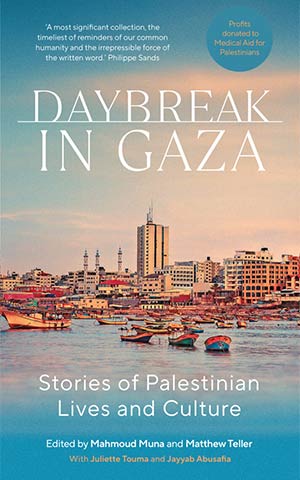 Daybreak in Gaza: Stories of Palestinian Lives and Culture
Daybreak in Gaza: Stories of Palestinian Lives and Culture
Ed. Mahmoud Muna & Matthew Teller
Saqi Books, 2024
This was Gaza. A place of humanity and creativity, rich in culture and industry. A place now pulverized and devastated; its entire population displaced by a seemingly endless onslaught. Today, as its heritage is being destroyed, Gaza’s survivors preserve their culture through literature, music, stories, and memories. Daybreak in Gaza is a record of that heritage, revealing an extraordinary place and people. Vignettes of artists, acrobats, doctors, students, shopkeepers, and teachers across the generations offer stories of love, life, loss, and survival. They display the wealth of Gaza’s cultural landscape and the breadth of its history. This remarkable book humanizes the people dismissed as mere statistics and portrays lives full of joy and meaning. Daybreak in Gaza stands as a mark of resistance to the destruction and as a testament to the people of Gaza.
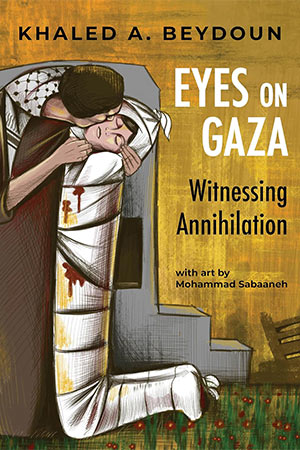 Khaled A. Beydoun
Khaled A. Beydoun
Eyes on Gaza: Witnessing Annihilation
Illus. Mohammad Sabaaneh
Street Noise Books, 2025
All the world’s eyes are now on Gaza and Palestine. Arab and Muslim American law scholar and author Khaled A. Beydoun shares his expertise and his perspective on the conflict in essays he wrote during the year following October 2023, accompanied by over sixty pieces of art created by Palestinian political cartoonist Mohammad Sabaaneh during the same time period.
Since October 2023, the world has been watching as a horrific siege has been waged in Gaza, a devastating bombing campaign carried out by the Israeli military in response to Hamas’s attack on Israeli civilians. We have witnessed the killing of tens of thousands of Palestinian civilians, mostly women and children, and our hearts are breaking. Eyes on Gaza is Beydoun’s attempt to process what we have been seeing.
Beydoun opens our eyes to the historic events and the political motivations that impact the decision-making of the leaders involved, as he shares his own story and his father’s story as Arab Muslims in America. He offers his expert perspective on events as they have unfolded. This book combines personal narrative, contemporary history, and thoughtful reporting to shine a light on the horror in Palestine today.
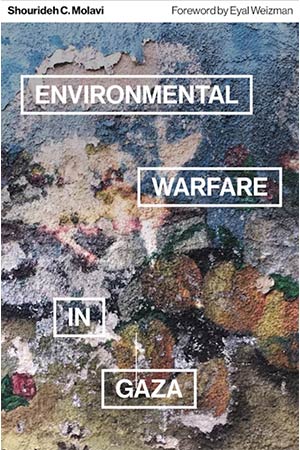 Shourideh C. Molavi
Shourideh C. Molavi
Environmental Warfare in Gaza: Colonial Violence and New Landscapes of Resistance
Pluto Press, 2024
The perimeter around the occupied Gaza Strip is formed by a sophisticated system of fences, forts, and surveillance technologies. With each Israeli incursion, a military no-go area, or buffer zone, is established along Gaza’s borders, extending deep into Palestinian residential areas and farmlands—further compounding the Gaza Strip’s isolation from the rest of Palestine.
Since 2014, the bulldozing of Palestinian lands by Israeli occupation forces has been complemented by unannounced aerial spraying of military herbicides, extending the reach of Israeli violence into the realm of chemical warfare. Today, the spraying has destroyed entire swaths of arable land in Gaza, forcibly changing a once-lush Palestinian landscape, and providing the Israeli army with better visibility to fire at Palestinian targets with lethal force from a distance.
This book is a vivid document of this latest stage of Israeli warfare, including original maps, images, and visualizations that deepen our understanding of its environmental and human impact. It collects new documents, original archival materials, stills of drone footage, firsthand testimonies of farmers, organizers and protesters, and documents of affected vegetation in Gaza as “silent witnesses” to Israeli settler-colonial violence.
 Paul Lawrence & Harriet Lawrence
Paul Lawrence & Harriet Lawrence
Going to School in Gaza: Lessons Learned in Thirty Years of Service in the Middle East
Independently published, 2022
In 1985 Paul and Harriet Lawrence packed up all their worldly possessions, picked up their two preschool-aged children, Bonnie and Ben, and moved to the Gaza Strip. In response to God’s call in their lives, they had accepted a position for Paul, a registered nurse, to teach in the Baptist School of Allied Health Sciences. Before leaving the US, they read books about Palestinians and talked to as many people as they could find who had actually been there. Nothing could have prepared them adequately for life in Gaza. Over the next thirty years, God used the people they met and the experiences they had to teach them about building relationships with others. In Going to School in Gaza: Lessons Learned in Thirty Years of Service in the Middle East, they share some of their stories and what they learned. They hope that you will be inspired to examine your own story and what God wants to teach you.
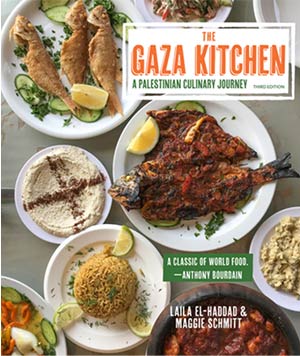 Laila El-Haddad & Maggie Schmitt
Laila El-Haddad & Maggie Schmitt
The Gaza Kitchen: A Palestinian Culinary Journey
Just World Books, 2012
This new edition of an award-winning cookbook shares with readers the little-known but distinctive cuisine of the Gaza region of Palestine, presenting 130 recipes collected by the authors. Cooks will find great, kitchen-tested recipes for spicy stews, piquant dips, fragrantly flavored fish dishes, and honey-drenched desserts. They will also be entranced by the hundreds of beautiful photos of Gazan cooks, farmers, and fresh-produce merchants at work, and by the numerous in-kitchen interviews in which women and men tell the stories of their food, their heritage, and their families. Anthony Bourdain, Claudia Roden, and Yotam Ottolenghi are among the many culinary figures who have embraced The Gaza Kitchen. This third edition features tantalizing new stories and recipes, a fresh new design in a beautiful paperback volume, new photos, and an updated index.
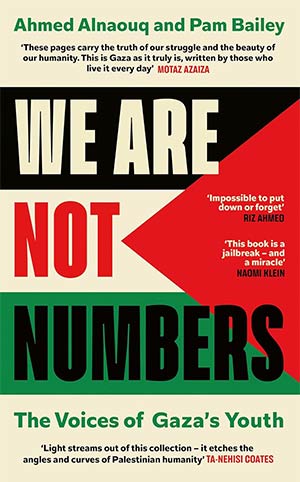 We Are Not Numbers: The Voices of Gaza’s Youth
We Are Not Numbers: The Voices of Gaza’s Youth
Ed. Ahmed Alnaouq & Pam Bailey
Olive Branch Press, 2025
A teenage girl stares at her roof, hoping it won’t collapse over her head. A young student searches the internet for photos of libraries around the world, hoping he’ll be able to visit them one day. Another walks around the city, taking notes of all the buildings she dreams of repairing. These are the stories of young people from Gaza, born under Israeli occupation and blockade. They have endured unspeakable struggles and losses, who keep fighting to be recognized not as numbers but as human beings with hopes, dreams, and lives worth living. We Are Not Numbers was founded in 2014 to give voice to the youth of Gaza. In this collection—vital, urgent, and full of heart, spanning over ten years to the present moment—we gain an unparalleled insight into the past as well as the current and next generation of Palestinian leaders, artists, scientists, and scholars and imagine where we might go from here.
Editorial note: Yousef Khanfar’s “My Palestine Bookshelf” appeared in the Summer 2021 issue of WLT, which he guest-edited. He also guest-edited the March 2013 photography issue of WLT, “Taking Pictures, Telling Stories.”
